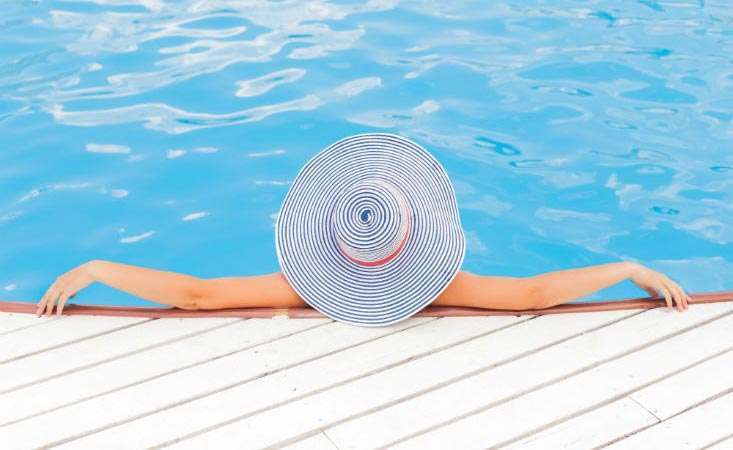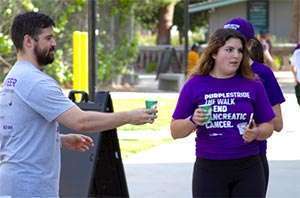
Too much sun and dehydration are concerns for pancreatic cancer patients. (Photo by Anna Demianenko)
Sun-kissed cheeks, warm breeze blowing through your hair and longer days of sunshine. Summer makes for a great time to get outside to take advantage of warm-weather activities like picnics in the park, exercising outdoors and poolside barbecues.
There are so many delights that pair perfectly with a hot, sunny day, but for pancreatic cancer patients, getting too much of a good thing can be dangerous. Sunburn is a potential threat, as are heat stroke, and dehydration.
Check out four of the top summer safety myths vs. facts, and the Pancreatic Cancer Action Network’s guide for staying safe in the sun this summer (and all year-round).
MYTH: The only way I can get Vitamin D is by spending time in the sun.
FACT: While it’s true that your body produces Vitamin D when the sun hits your skin, you can also get the essential vitamin by taking Vitamin D supplements or a multivitamin, or by eating foods that contain it (both naturally and fortified):
- Dairy products like milk, cheese or yogurt
- Egg yolks
- Chicken or beef liver
- Fatty fish like salmon, tuna or mackerel
- Ready-to-eat breakfast cereals
- Orange juice
- Mushrooms
Spending a short amount of time in the sun (15 minutes a few times a week), even while wearing sunscreen, will help your body produce sufficient Vitamin D.
Vitamin D is an important nutrient that is essential for calcium absorption. If you don’t get outside much, or if you live in an area with little sun or long winters, talk to your doctor to ensure you’re receiving sufficient levels of Vitamin D.

It’s best to apply sunscreen before venturing outdoors. Then reapply as you sweat or swim.
MYTH: I don’t need sunscreen if it’s cloudy outside.
FACT: UVB rays can still reach your skin on cooler, cloudy days. In fact, spending an extended period of time outside on cloudy, rainy or chilly days can put you at risk for skin damage from the sun, even if you don’t burn easily.
MYTH: I have darker skin, or I tan instead of burning, so I don’t need to wear sunscreen.
FACT: Even if you do not get burned, the exposure to the sun can cause damage to the skin and that can lead to skin cancer. The American Cancer Society estimates that there will be more than 90,000 cases of melanoma this year alone. Of those diagnosed, 7,230 will die from the disease.
Additionally, if you’ve had surgery or radiation, you’ll want to protect those areas, as they can be more sensitive to the sun’s rays. That’s why it’s best to:
- Wear SPF30 or higher sunscreen (don’t forget to apply to ears, neck and scalp if these areas are exposed)
- Stay out of the sun when UV light is the strongest, typically between 10 a.m. and 3 p.m.
- Dress in dark colors (although they attract heat, they reflect sun rays) and long pants or long sleeves when possible
- Put on a cap or wide-brimmed hat to protect your head and face
- Wear sunglasses with polarized lenses to protect your eyes
MYTH: If I’m not thirsty, I don’t need to drink fluids.

Hydration is key to preventing heat-related issues.
FACT: If you’re thirsty, your body is signaling that it’s already in the beginning stages of dehydration and you should have something to drink. Whether you’re out hiking and biking, doing yard work or just lounging by the pool, staying hydrated is important.
Select caffeine-free, low sugar beverages like water, a sports drink or juice to prevent dehydration. Plus, cold beverages can also help you feel more comfortable during hot days.
Come back to our blog each week for a new installment of the Friday Fix.
















